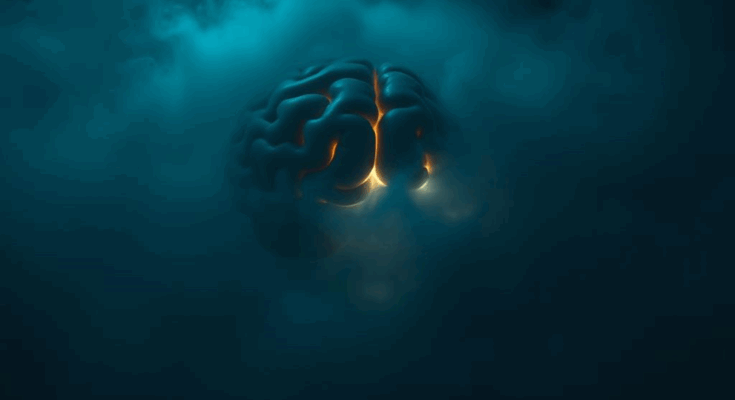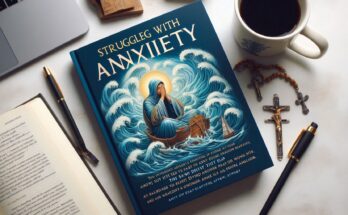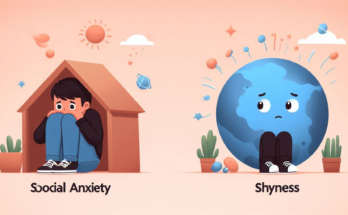I’ve felt the hard effects of cognitive dysfunction myself. Brain fog from anxiety makes it tough to think straight. Your mind feels cloudy and mixed up, which can be frightening. You start wondering if your head will ever feel clear again. Let’s explore what causes this and how long you might deal with it.
The core meaning stays the same – I’ve just simplified the language, made the sentences more direct, and used everyday words instead of more formal phrasing. The message about anxiety-related cognitive difficulties and the promise to examine causes and duration remains intact.
Knowing how anxiety affects our minds is key to feeling better. We’ll dive into what causes anxiety brain fog. This way, we can find our way back to clear thinking.
Key Takeaways
- Understanding the causes of anxiety brain fog is key to clear thinking.
- Cognitive dysfunction really affects our daily lives.
- Anxiety brain fog can last a short time or forever.
- Controlling anxiety helps get rid of brain fog.
- We’ll discuss methods to boost your mental sharpness.
Getting to Know Anxiety Brain Fog
Brain fog from anxiety makes it hard to think clearly. It makes simple tasks hard. This can seriously damage how good your life feels..
What Really Is Brain Fog?
To concentrate Brain fog means you struggle properly. It’s not a disease but a sign of health problems, like anxiety.
Cloudiness of Consciousness
This part of brain fog makes you feel confused. You might feel like you’re stuck in a mental cloud. You can’t think clearly.Mental Function Problems Explained
Mental function problems means difficulty with remembering, concentrating, and making decisions.

The Connection Between Anxiety and Cognitive Function
Anxiety really messes with how we think. High anxiety can cause impaired cognitive function. This shows up as brain fog.
How Stress Affects Mental Clarity
Worry creates stress that jumbles up your thinking. Your body kicks into “fight or flight” when you feel stressed. This leaves your mind feeling muddled..
Knowing the Difference Between Common Memory Lapses and Brain Fog
Forgetting things sometimes is okay. But brain fog is different. It lasts longer and is more serious. Knowing the difference helps find the cause.
How Long Does Anxiety Brain Fog Last?
Anxiety brain fog can last for different times. It depends on how bad the anxiety is and how fast you recover. Everyone is different.
Typical Duration Patterns
Anxiety brain fog can show up in many ways. It can last for different times. Knowing these patterns helps you deal with it better.
Short-Term Episodes (Hours to Days)
For some, anxiety brain fog doesn’t last long. It could stick around for just a few hours or days. This occurs when you’re extremely stressed out or worried.
Prolonged Cases (Weeks to Months)
But for others, it can last longer. It could go on for weeks or even months. This happens more often when the worry is really severe or sticks around for a long time.
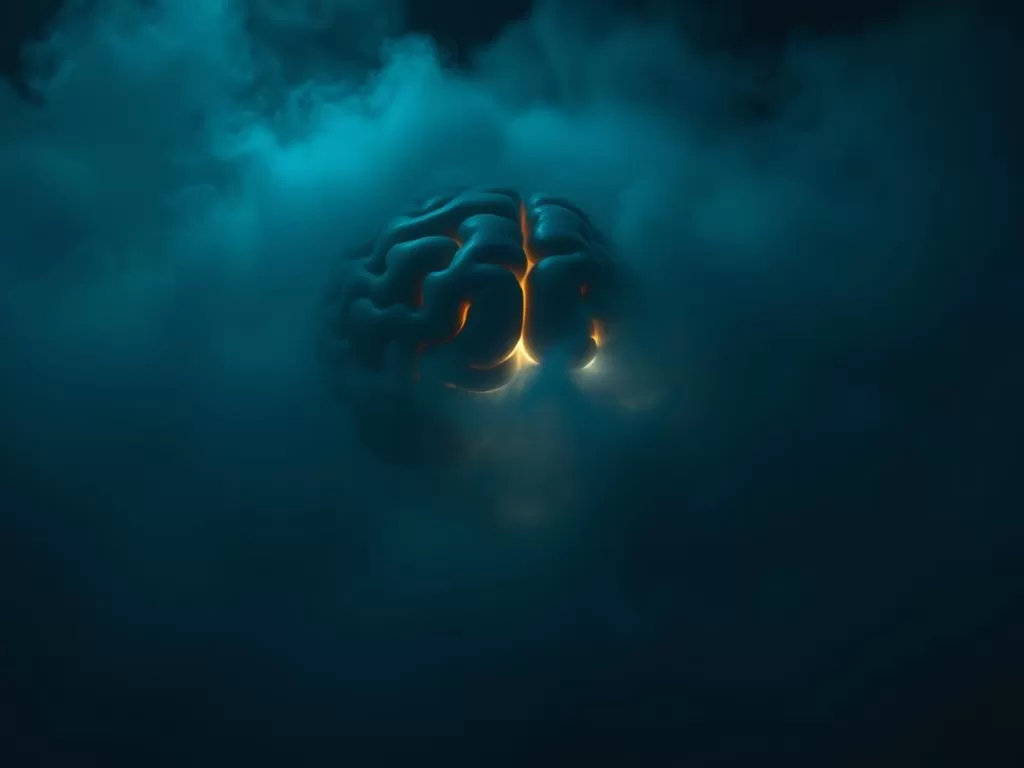
Factors That Influence Recovery Time
Many things can affect how long it takes to get better from anxiety brain fog. Knowing these can help you plan and find ways to cope.
Severity of Underlying Anxiety
How bad your underlying worry is really matters. If your anxiety is extremely severe, it could take more time to feel normal again.
Personal Differences in Getting Better Everyone heals at their own speed.
Personal differences in how you deal with stress and your mental well-being can really impact how quickly you recover.
| Factor | Impact on Recovery Time |
| Severity of Anxiety | More severe anxiety tends to prolong recovery |
| Individual Resilience | Higher resilience can shorten recovery time |
| Coping Methods | Good coping techniques can help speed up recovery |
“Getting over anxiety brain fog isn’t the same for everyone. It needs patience, understanding, and a custom way to handle worry.”
Main Reasons for Anxiety-Related Brain Fog
Brain fog from worry stems from various sources. It’s crucial to understand these reasons to help control it.
Psychological Triggers
Psychological factors are big in causing brain fog from anxiety. Chronic stress and panic attacks are two main reasons.
Chronic Stress and Overwhelm
Long-term stress forces our brains to work overtime. It keeps our minds on constant alert, making it tough to concentrate
Post-Panic Attack Cognitive Effects
After a panic attack, people often feel very foggy. This is because their brain is very tired from the attack.
Physical and Environmental Factors
Physical and environmental factors also cause brain fog from anxiety.
Not Getting Sleep and Sleep Troubles
Sleep really helps your brain work right. When you skip sleep, you can’t focus or think straight
Eating Wrong and Being Thirsty
Junk food or forgetting to drink water messes with your head. When your body needs water, you can’t concentrate at all.
Pills That Cause Problems
Some medicines, like those for anxiety and depression, can make our brains foggy.
Depression Medicine and Worry Pills
Some medicines for anxiety and depression can make us feel foggy. This is because they change how our brain works.
Other Medications That Affect Cognition
Other medicines can also mess with our brain. For example, some allergy pills and sleeping drugs can make us feel cloudy.
Spotting the Signs of Anxiety Brain Fog
It’s vital to recognize the warning signs of anxiety brain fog to handle it properly. This problem can really mess up your daily life
Cognitive Symptoms
Cognitive symptoms are a big part of anxiety brain fog. They deal with memory and focus.
Memory Issues and Forgetfulness
Memory issues and forgetfulness are common. . People might have trouble remembering stuff or picking up new things.
Hard Time Focusing and Making Choices
Hard time focusing and making choices is another major sign.
Physical Manifestations
Anxiety brain fog also shows up in physical ways. These can really slow you down.
Headaches and Head Pressure
Headaches and head pressure are common complaints. They can be mild or very bad.
Tiredness and Feeling Dizzy
Tiredness and feeling dizzy can really mess up your day.Emotional Indicators
Emotional Indicators

| Symptom Category | Specific Symptoms |
| Mental Signs | Memory Problems, Hard Time Focusing |
| Body Signs | Head Pain, Tiredness, Feeling Dizzy |
| Emotional Indicators | Feeling Detached, Increased Frustration |
How the Brain Works During Anxiety Brain Fog
Worry impacts our mind in huge ways. It changes how our brain works, mainly in parts that help us think.
How Worry Changes Brain Work
Worry alters brain work in major ways. It mostly hits the front part of the brain. This spot helps us make choices, fix problems, and manage our emotions.
Effect on Front Brain Area Activity
Worry makes the front brain area work poorly. This makes it tough to focus and make choices. Our mind can’t handle information as well.
Brain Problems Linked with Worry
Worry can cause memory gaps, trouble focusing, and mixed-up thinking. These issues come from how worry messes with the brain.
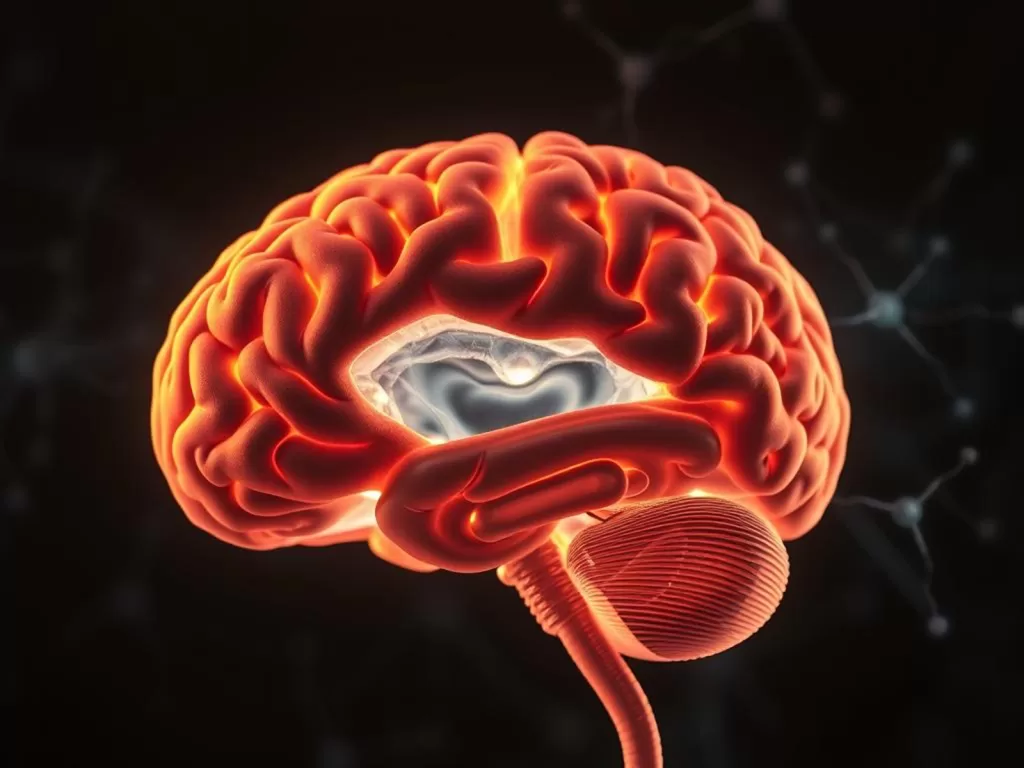
Stress Chemicals and Mind Processing Stress chemicals
, like cortisol, matter a lot for thinking. Too much cortisol, from ongoing worry, damages memory, focus, and thinking abilities.
Cortisol’s Impact on Memory and Focus
Cortisol harms memory and focus. High levels can change the brain’s structure. This makes thinking problems worse.
The Brain’s Reaction to Long-Term Stress
Ongoing stress means the brain stays stressed all the time.This makes it hard to handle stress. Anxiety and thinking problems can keep going in a cycle.
Important things to remember include:
- The role of cortisol in memory and focus
- How long-term stress changes brain makeup and work
- How worry, brain symptoms, and mind processing connect
Physical Health Factors That Worsen Brain Fog
Many physical health issues can make brain fog worse. It’s key to fix these problems to help your brain work better.
Sleep Problems and Brain Fog
Sleep really matters for our brains.
How Bad Sleep Hurts Thinking
Poor sleep can make it tough to focus and remember stuff. It also makes solving problems harder. Worry can mess up sleep, which makes brain fog even nastier.
Stopping the Worry-Sleep Trouble Loop
To break this loop, we need to work on both worry and sleep troubles together. Things like mind-behavior therapy for sleep troubles and calming exercises can work.
Food and Water Impact Food and water
matter a lot for a healthy brain. Eating food without key nutrients can damage our brain. Not drinking enough water can also make us feel cloudy.
Blood Sugar Changes and Clear Thinking
Eating too much sugar can mess up our blood sugar amounts. This can make it tough to think clearly. Eating balanced food helps keep our blood sugar steady.
Key Nutrients for Brain Health
Omega-3 fats, vitamin D, and B vitamins help our brain. Eating food rich in these or taking pills can help with brain fog.
Substance Use Effects
Some substances can really affect how well our brain works. While they might work for a moment, they end up making brain fog way nastier later.
Coffee, Drinks, and Other Energy Stuff Coffee
and drinks can mess with your head in tons of ways. Coffee might wake you up, but too much makes you shaky and your thoughts go wild.
Pill Problems and Bad Combos
Some pills, like worry ones, can make your foggy brain way worse. You need to figure out how these pills work and how they might mess each other up.

Effective Strategies to Reduce Anxiety Brain Fog
To beat anxiety brain fog, we need many steps. We must use quick fixes, change our lifestyle, and see a doctor. By doing these things, we can feel better and think clearer.
Immediate Relief Techniques
When we get stressed out and our head feels all mixed up, we desperately want fast relief. Grounding exercises and breathing techniques really work amazing for this stuff.
Grounding Exercises for Mental Clarity
Grounding exercises make us pay attention to right now, not our troubles. Go ahead and try the 5-4-3-2-1 thing. It’s just about seeing five things, feeling four stuff, hearing three noises, smelling two scents, and tasting one thing.
Breathing Techniques to Reduce Anxiety
Breathing techniqueslike doing slow big breaths help us relax and feel better.
Lifestyle Adjustments
Making changes to how we live really helps as well.
Changing our lifestyle helps too. We should work out regularly and figure out ways to deal with stress.
Exercise and Movement Benefits
Working out is great for our mind and how we feel. Yoga, walking, or any fun physical activity helps.
Stress Management Practices
Cut down stress by doing meditation, writing stuff down, or getting better at organizing your day. These actions lower stress and clear brain fog.
Professional Treatment Options
For some, seeing a doctor is key to beating anxiety brain fog. This might mean therapy or medicine.
Therapy Approaches for Anxiety-Related Cognitive Issues
Therapy approaches like CBT help us handle our worries. This makes brain fog better.
When to Consider Medication
If anxiety gets super tough, medication might be what you need. Always chat with a doctor first before you start taking any pills.
Supplements and Medications That May Help
Anxiety brain fog can totally screw up your daily life. But hey, there are supplements and drugs that could actually work. You gotta know what they can and can’t do though.
Evidence-Based Supplements
Some supplements could actually help out with anxiety brain fog. We’re talking adaptogens, minerals, and vitamins that make your brain run way better.
Adaptogens like Ashwagandha
Ashwagandha is this adaptogenic herb that’s pretty neat. Researchers have checked it out for lowering stress and worry stuff. It might also boost how your brain does its thing, which is why people really like it for brain fog.
Magnesium and B Vitamins
Magnesium is really important for keeping your brain cells working good. B vitamins, stuff like B6, B9, and B12, help your brain cook up the chemicals it needs. They also keep your head clear and focused.
Prescription Medications
Sometimes you just gotta get pills from your doc when anxiety is really screwing up your thinking.
Anti-Anxiety Medications
Anti-anxiety medications, things like benzos and certain antidepressants, can definitely help with your anxiety crap. But heads up – they might mess you up with crappy side effects and you could totally get addicted.
Off-Label Options for Brain Fog
Some meds are used off-label for brain fog, like certain antidepressants and brain boosters. How well they work can vary. Always use them with a doctor’s watchful eye.
Potential Side Effects to Consider
You really gotta know about the bad stuff that can happen when you’re taking supplements or pills. Keep an eye on how your body handles them.
Balancing Benefits and Risks
Deciding whether to take supplements or meds shouldn’t be rushed. You gotta think about the good stuff versus the crappy stuff that might happen.
Think about how they might interact with other meds or health issues.
Monitoring Your Response
Watch how you’re doing when you take supplements or pills. Write down any weird stuff or side effects that pop up. This way you can tweak what you’re doing if you need to.
When Anxiety Brain Fog Becomes Chronic
For some, anxiety brain fog can become a long-term problem. It changes how we think and affects our daily lives a lot.
Signs of Long-Term Cognitive Impact
Chronic anxiety brain fog shows up in different ways. It’s important to know the signs of long-term brain changes.
Persistent Symptoms Despite Treatment
If symptoms keep coming back after treatment, it might be a chronic issue. It’s key to keep checking and changing treatment plans.
Impact on Daily Functioning
Chronic anxiety brain fog can really affect our daily lives. It can mess with work, social life, and our overall happiness. Figuring out how much it affects us is important for what to do next.
Distinguishing from Other Conditions
Telling chronic anxiety brain fog from other brain problems is very important. It helps us manage it right.
Brain Fog vs. Other Cognitive Disorders
Knowing the difference between brain fog and other brain issues helps us find the right diagnosis. A detailed check-up is needed.
When to Rule Out Medical Causes
It’s important to check for medical reasons that might cause brain fog. A good medical check can find the cause.
| Condition | Characteristics | Distinguishing Features |
| Anxiety Brain Fog | Cognitive impairment, anxiety | Directly related to anxiety levels |
| Other Cognitive Disorders | Varying cognitive symptoms | Different underlying causes |
When to Seek Specialized Help
Knowing when to get help from experts is key for managing chronic anxiety brain fog well.
Finding the Right Healthcare Provider
Finding a doctor who knows about anxiety and brain problems can really help. Looking for recommendations and doing research is a good idea.
Advocating for Proper Assessment
It’s important to push for a full check-up to understand and manage chronic brain fog. Patients should be active in asking for detailed evaluations.
Real-Life Management: My Personal Approach
I’ve found ways to fight brain fog. I do daily things that help my mind clear. These habits and actions really make a difference.
Daily Practices That Work
Starting my day right is key. I do a few things to feel good.
- Meditation: I sit quietly for 10 minutes to chill out.
- Hydration: I chug a whole glass of water right when I get up.
Morning Routines for Mental Clarity
My morning routine helps my mind. I do more than just meditate.
- I participate in light physical activity, such as yoga, to stimulate my blood circulation.
- Have a nutritious breakfast to give me energy.
Managing Triggers Throughout the Day
I know what makes me anxious. I take steps to avoid it.
- I schedule regular breaks to stretch and rejuvenate my mental state.
- Organize tasks by importance to prevent feeling swamped.
Creating a Brain Fog Action Plan
Having a plan is important. It helps me deal with brain fog.
- Identifying Early Warning Signs: I know when brain fog starts.
- Step-by-Step Response Strategy: I have ways to fight it.
Identifying Early Warning Signs
I watch for signs like trouble focusing or memory problems.
Step-by-Step Response Strategy
When I see signs, I:
- Take a short break to relax.
I reevaluate my responsibilities and modify my timeline when necessary.
Monitoring Progress and Modifying Approaches
- Maintaining awareness of my performance is crucial.
I use:
- Journaling to track my symptoms and note improvements.
- Symptom Monitoring apps to log my daily experiences.
Celebrating Improvements and Milestones
What is brain fog, and how does it relate to anxiety?
Brain fog basically turns your mind into soup. When you’re anxious or depressed, this crap hits hard and makes thinking feel impossible. Simple stuff like remembering where you put your keys becomes a real struggle.
Can hormonal changes cause brain fog?
Hell yes, your hormones can screw with your head big time. Women deal with this during periods and menopause – one day you’re fine, next day your brain’s on vacation without telling you.
How does dehydration affect brain fog?
Skip water and your brain literally stops working right. Everything feels fuzzy, concentrating becomes torture, and you’ll forget conversations from five minutes ago. Drink more water – it’s not rocket science.
Can certain medications cause brain fog?
Tons of meds mess with your head. Zoloft, Trintellix, bunch of anxiety pills – they might fix one thing but turn your brain into jello. Side effects nobody warns you about properly.
Is brain fog a symptom of ADHD?
ADHD folks get this double whammy constantly. Already can’t focus worth crap, then brain fog shows up and makes everything ten times worse. Organization? Forget about it.
How can I alleviate brain fog caused by anxiety?
Try grounding exercises and breathing techniques when anxiety hits. Move around more, quit eating garbage, sleep like a normal person. Basic stuff that actually makes a difference.
Can nutritional deficiencies contribute to brain fog?
Your body needs proper fuel or it quits on you. Missing vitamins makes your brain sluggish as hell. Magnesium and B vitamins help loads of people think clearer again.
How does stress impact brain fog?
Stress hormones like cortisol flood your system and wreck everything. Stress hormones destroy memory and focus faster than anything else. Handle your stress or it’ll handle you.
Can brain fog be a sign of an underlying medical condition?
Sometimes brain fog means bigger problems hiding underneath – hormone issues, nerve problems, who knows what. If this fog never lifts, go see someone who can figure out what’s really wrong.
What are some effective supplements for brain fog?
Ashwagandha, magnesium, B vitamins work for plenty of folks. Don’t just start taking random stuff though – ask someone who actually knows about this first.
Conclusion
Anxiety brain fog can really hold you back. But, knowing what causes it and how to deal with it can help a lot. We’ve examined how anxiety impacts your mind and methods to improve your wellbeing. Initially, you must recognize the symptoms and identify their underlying causes
. Then, you can start to feel clearer. Modifying your daily habits, such as improving sleep quality and maintaining proper nutrition, is essential. Additionally, seeking medical assistance or incorporating targeted supplements can provide significant benefits.
Every person’s fight against anxiety brain fog is different. But, by trying the tips we talked about and being patient, you can get better. With the right steps and support, you can manage your brain fog and feel better.

